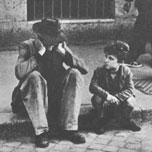It's a Wonderful Life 'most inspirational film' ever: Bah Humbug!!

There are many things which annoy me and the film It's a Wonderful Life makes me want to pick up something heavy and lob it at my television screen everytime that twee little film is on at Xmas. So, imagine my horror when I saw it's been voted as the "most inspirational film ever made" by the American Film Institute (AFI).
Inspirational for what? Mawkish sentimentally .... Oh yes. Saccharine coated pig-swill ... most certainly. Instead the AFI state that the film has given people fresh hope at times of trauma and devastation. But frankly this isn't the film to do that, instead maybe, it gives people a "quick fix" and some kind of reassurrance or just downright escapist nostaligia but inspirational? Nope...
Don't get me wrong I like my escapism like the next person but this film has a far deeper and conservative message.
I am not a fan of David Mamet but he wrote an excellent piece in the Guardian in December 2001 and an extended version appeared in the same month in Sight and Sound magazine. Mamet compares Capra's seasonal family film to A Christmas Carol and that at the centre it is not Scrooge but Bob Cratchit. Cratchit or George Bailey runs the gauntlet of redemption and second chances. The community and the family are important features in his life and maintaining that order is important to George. Yet George is a banker and an altrusitic one which throws up so many contradictions such as that he may be a capitalist but he is a kind one!
The myth, as well, that George Bailey and his family are happy but poor. Because being poor is a kind of a redemption and something which should be admired. But like all good escapism the poverty issue is resolved by George's rich friend and everything is once again snug and secure in Capra's fantasy.
Mamet also compares It a Wonderful Life (1946) to De Sica's The Bicycle Thieves (1948) where the characters are not one-dimensional happy poor people but real human beings in real poverty and experiencing real situations. There are no such convenient happy endings in De Sica's film. What is also apparant is the old-fashion lushness of It's a Wonderful Life compared to the monochrone grainy neo-realism of The Bicycle Thieves.
As Mamet ends his article with, "we should perhaps note our unremarked acceptance of the metaphor of happiness as wealth".
That is why I am using a photo to advertise this post of The Bicycle Thieves.
To finish with I would like throw open the comments and ask you what films have influenced and inspired you.
My three films are: Battle of Algiers
Kes
Night of the Hunter (primarily due to the "painterly style" of the late and great cinematographer Stanley Cortez and a shame that Charles Laughton never directed again)


